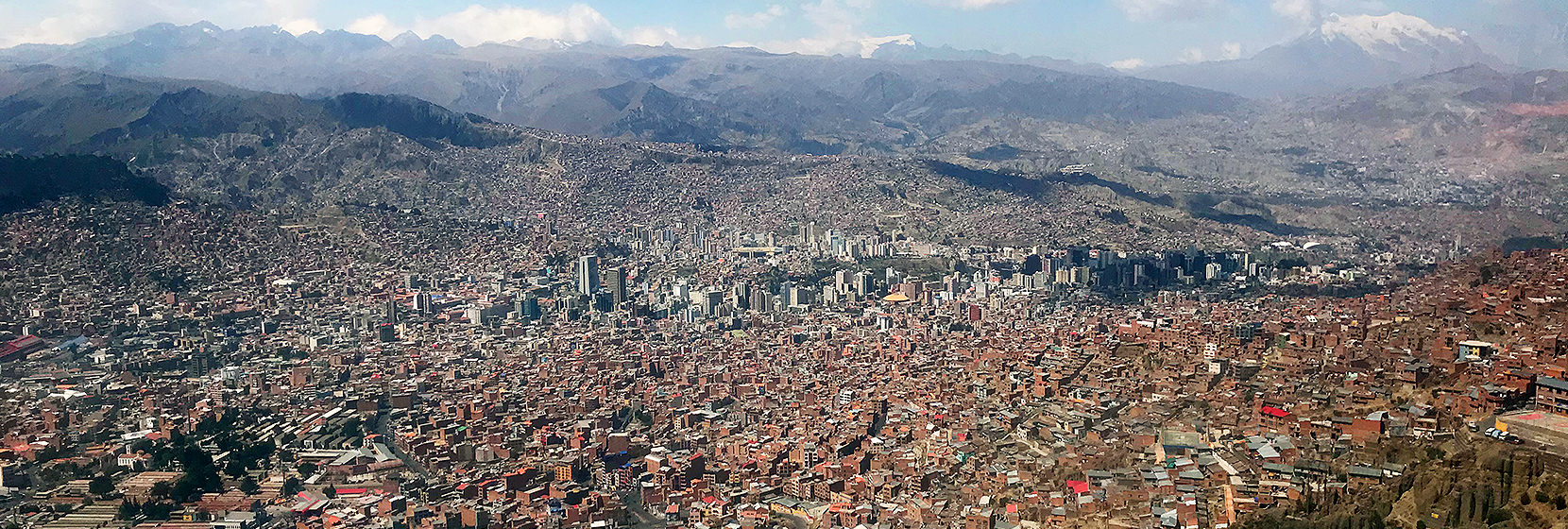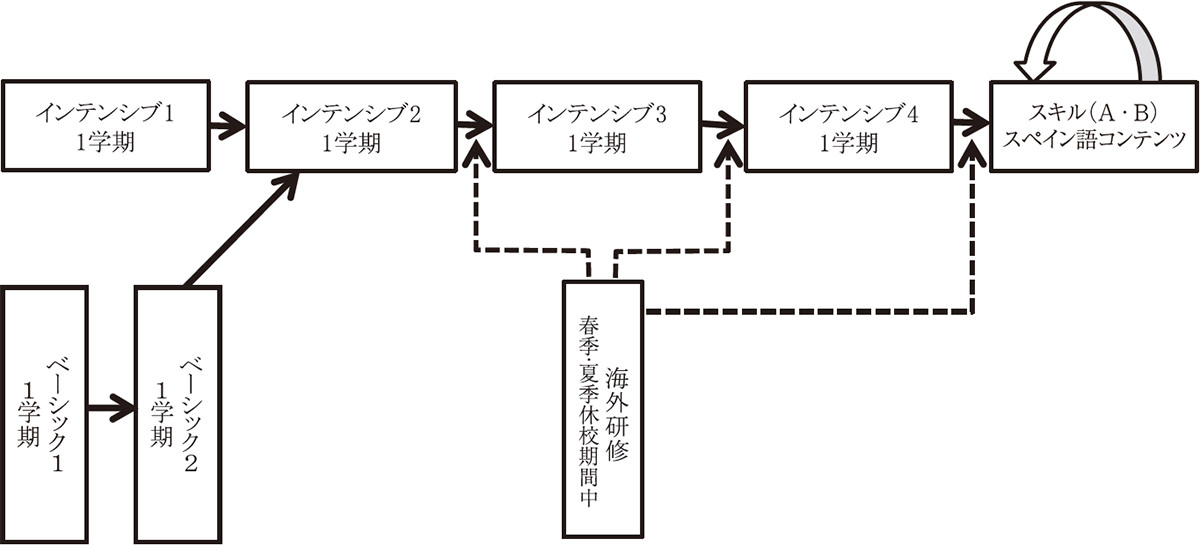
スペイン語Spanish
はじめに
スぺイン語はヨーロッパだけでなく、アメリカ大陸でも重要な位置を占め、ラテンアメリカだけでなく、アメリカ合衆国内でも話者と学習者が増え続けています。SFCのスペイン語・スペイン語圏研究室は、スペイン語の広域言語としての有用性だけでなく、スペイン語圏内の多様性と複雑性にも焦点を当て、高い言語能力の養成と社会・文化面への理解力の養成に取り組んでいます。
SFCでは、学生のレベル・ニーズに応じて、どのコースからでもスタートできます。ベーシック1・インテンシブ1以外のクラスからスタートしたい人は、毎学期の始めに行なわれる資格認定試験に合格し、スペイン語研究室から履修の許可を得る必要があります。既習者で自分がどのコースから始めたらよいか分からない人は、これまでのスペイン語学習歴を明記のうえ、スペイン語研究室まで相談してください。スペイン語圏での生活経験がある人のために、高い水準のスペイン語に向けたブラッシュアップをするコースもあります。
スペイン語研究室のモットーは「楽しみながら深みと高みを目指す」です。SFCスペイン語スタッフ一同、意欲的な学生諸君の受講をお待ちしています。
科目ごとの授業内容
SFCスペイン語研究室では、2018年度より高大連携に取り組んでいます。SFC高等部で週4コマの授業を履修した場合はインテンシブ1、週2コマの授業を履修した場合にはベーシック1の授業にほぼ相当し、それに続くインテンシブ2およびベーシック2の授業から受け始めることが可能です。ぜひ十分に復習をしたうえで資格認定試験を受けにきてください。
※スペイン語の授業では、2021年度より、順次新しいバージョンの教科書を導入 していっています。シラバスで詳しい指示を書きますので気をつけてください。
1. インテンシブ1~4
スペイン語インテンシブコースはSFCの他の言語と同様、コミュニケーションと創造性を重視した独自の教育システムと教材にもとづいた授業を行ないます。具体的な内容は下記のとおりですが、受講生諸君の意見・要望も採り入れて、よりよいシステム・教材を作り上げたいと思っています。
インテンシブ1は、スペインで制作された国際教材のAula Internacional 1 を用いて、ヨーロッパ共通言語参照枠(CEFR)A1レベルの内容を学びます。
インテンシブ2は、Aula Internacional 2 を用いて、A2レベルの内容を学びます。
インテンシブ3は、Aula Internacional 3 を教材として用い、B1レベルの内容を学びます。
インテンシブ4は、Aula Internacional 3 の残りの部分を扱いつつ、ラテンアメリカとスペインの歴史・文化・社会・政治・経済などに関するコンテンツ・ベースのリーディング・ライティング・プレゼンテーション・翻訳等を扱います。
2. ベーシック1~2
ベーシック1は、初習者を対象にして、「スペイン語圏の文化・社会を背景とした日常会話で使用される基本文・基本語彙を理解し、応答できる基礎的なコミュニケーション能力を身に付けること」を目標にします。
主教材はスペインで制作された国際教材(Aula Internacional 1) で、文法事項の発見重視の学習、会話練習、聞き取り、アクティビティ、スキット発表を行ないます。
ベーシック2は、ベーシック1修了者を対象にして、「基礎的な文法知識と会話能力をさらに高め、スペイン語での一般的な会話に不足のない文法項目と語彙の導入」を目標にします。主教材はベーシック1の続きです。ベーシック1とベーシック2はあわせてインテンシブ1の内容に相当します。ベーシック2を修了するとインテンシブ2へと進むことができます(後ろの「授業体系図」も参照)。スペイン語では、インテンシブ1とベーシック1・2の重複履修はできません。
3. スキル・コンテンツ
DELE B1合格程度のスペイン語力を有する人を対象にした、より高水準の内容のスペイン語を扱うクラスで、インテンシブ4を修了した時点で履習が可能になります。
原則としてインテンシブ4修了者が対象です。より高度なスペイン語の運用力を要請するスキルA、第二言語習得論を用いたスペイン語教育の課題に取り組むスキルB、スペイン語圏の文化と社会についてスペイン語で学び、討議を行うスペイン語コンテンツが開講されます(2020年度より一部内容が変更となる可能性があります。)。スペイン語コンテンツは先端科目「地域と文化(スペイン語圏)」としても開講されます。なお、スキルとコンテンツは繰り返し受講が可能です。
4. 海外研修
春休みまたは夏休みにスペイン語圏で研修を希望する学生のため、スペイン語研究室では下記の要領で単位(海外研修Aは4単位、海外研修Bは2単位)を認定します。
- 原則として、スペイン語インテンシブ2以上の修了者または特別に研修を認められた学生が対象で、事前にスペイン語研究室に申し込み、了解をとる必要があります。
- 研修の募集は研修直前の学期中に行ないますので、要綱をよく読んで応募してください。研修は、原則として、団体で、下記のいずれかの大学で行ないます。また、受講終了後、授業時間数が明記された成績証明書をスペイン語研究室(担当:藤田護)に提出し、研修終了直後の学期に、スペイン語海外研修AまたはBの履修登録を必ず行なうことを忘れないでください。これを怠った場合には単位として認められません。
- 研修機関は下記のとおりです。個人で研修を希望する場合は、事前に先方と連絡をとり、十分に準備してください。
- サン・セバスティアン(スペイン) TANDEM サンセバスティアン
研修期間:4週間 - サラマンカ(スペイン) レトラ・イスパニカ Letra Hispánica(www.letrahispanica.com)
研修期間:2週間または4週間 - クスコ(ペルー) セントロ・ティンクーCentro Tinkú
研修期間:4週間 - 海外研修を複数回履修する場合には、履修するクラスが、その前に履修したクラスよりも高度な内容であることを示すなんらかの証を、授業時間数を含む成績証明書とともにスペイン語研究室に提出します。
授業体系図

- モデルはあくまで目安であり、履修するクラスがわからない場合はスペイン語研究室にお問い合わせください。
注:スペイン語コースの詳しい内容はスペイン語研究室Webサイト上のスペイン語コース紹介を、また各クラスのシラバスは、同サイト内時間割の中の当該科目をクリックすれば閲覧できます。 - スペイン語の履習を通じてスペイン語圏の社会に関心が出てきた学生は、藤田が担当する先端科目「地域と社会(米州)」や、「スペイン語コンテンツ」/「地域と文化(スペイン語圏)」を履修し、藤田の研究会Bに参加して、関心を持ったテーマを更に深めることも可能です。
教員スタッフ
- 藤田 護
Mamoru Fujita - 慶應義塾大学環境情報学部専任講師、日本出身。専門分野は、ラテンアメリカ地域研究、アンデス先住民の人類学、開発の人類学、アイヌ語とアイヌ語の口承文学。
- Roxana Shintani
ロクサーナ・シンタニ - ペルー出身。専門は日本人のラテンアメリカ移民と日本の日系人社会、およびこれらの社会における継承言語としてのスペイン語教育。
- Aingeru Aroz Rafael
アインゲル・アロツ・ラファエル - スペイン出身。専門は日本の言語学史、スペイン語教育、及びバスク語の社会言語学。
- 小倉 麻由子
Mayuko Ogura - 日本出身。専門分野はスペイン語教育。
- Antonio Duque Lara
アントニオ・ドゥケ・ララ - スペイン出身。専門分野はスペイン文学、日本文学、翻訳。
- Carmen García
カルメン・ガルシア - スペイン出身。専門はスペイン語教育。
- Verónica Prieto
ベロニカ・プリエト - アルゼンチン出身。専門分野はスペイン語教育。
- Patricia Rosales
パトリシア・ロサレス - メキシコ出身。専門分野は法学、ラテンアメリカ政治。
- 高畠 理恵
Rie Takabatake - 日本出身。専門分野はスペイン語学、在日中南米子弟への継承語としてのスペイン語教育、高等学校における第二外国語としてのスペイン語教育。
- 高木 和子
Kazuko Takagi - インタースペイン代表取締役。日本出身。専門分野は経営学。
※2019年度のみ出講せず - Patricia Belén Takayama
パトリシア・ベレン・タカヤマ - アルゼンチン出身。専門分野は国際ビジネス。
- Diego Yonamine
ディエゴ・ヨナミネ - アルゼンチン出身。専門はジャーナリズム、国際協力、日系人社会
Introduction
The Spanish language occupies an important place not only in Europe but also in the Americas, with an ever-increasing number of speakers and learners in the United States as well as in Latin America. The SFC's Spanish and Spanish world Lab focuses not only on the usefulness of Spanish given its status as a widely spoken language, but also on the diversity and complexity of the Spanish world, and seeks to cultivate a high level of linguistic proficiency and understanding of its social and cultural aspects.
Here at SFC, students can start from any course level depending on their level or needs. Students who would like to start learning without taking Basic 1 or Intensive 1 are required to take a language placement test held at the beginning of each semester, and to receive an approval from the Spanish Lab to take the course. Those who are already learning Spanish and do not know which course to start with should write up a note detailing what you've done so far to learn Spanish and consult with the Spanish Lab. A brush-up course is also available for those who have lived in Spanish-speaking countries who are toward the advanced Spanish level.
The motto of the Spanish Lab is "Have fun immersing yourself in Spanish and shoot for the stars." We look forward to welcoming highly motivated students.
Course Contents
The SFC Spanish Lab has been promoting a high school-university partnership since the 2018 academic year. The SFC Senior High School graduates who studied Spanish four class slots a week (which corresponds to Intensive 1) or two class slots a week (which corresponds to Basic 1) may start from Intensive 1 or Basic 2 respectively. These students may take the corresponding course upon passing a placement test.
*Spanish classes have been using new versions of textbooks since the 2021 academic year. Make sure to refer to the syllabus for detailed instructions.
1. Intensive 1-4
Like the other languages taught at SFC, the Spanish Intensive course is conducted based on a unique education system and materials focused on communication and creativity. Details are as follows. We welcome feedback and requests from students to improve our system and materials.
Intensive 1: Learning Spanish equivalent to A1 level of the Common European Framework of Reference for Languages (CEFR) scale using the Aula Internacional 1, international teaching materials produced in Spain.
Intensive 2: Learning A2 level of the CEFR scale using the Aula Internacional 2
Intensive 3: Learning B1 level of the CEFR scale using the Aula Internacional 3
Intensive 4: Covering the rest of the Aula Internacional 3, as well as reading, writing, giving presentations, translating using materials based on the history, culture, society, politics, and economics of Latin America and Spain.
2. 2. Basic 1-2
Basic 1 is designed for beginners to acquire basic communication skills necessary for daily conversation through learning and using basic phrases and vocabularies in the context of cultures and societies in the Spanish world.
We use the Aula Internacional 1 textbook produced in Spain. The course will focus on heuristic learning including grammar, conversation practice, listening comprehension, activities, and skit presentations.
Basic 2 is for those who completed Basic 1 to learn grammar and vocabulary sufficient for general conversation through further improving basic knowledge of grammar and conversational skills. Students will continue to use the same textbook as Basic 1. Basic 1 and 2 correspond to the content of Intensive 1. After completing of Basic 2, students can advance to Intensive 2 (refer to the class system diagram below). In the Spanish courses, students who acquired credits from Intensive 1 cannot take Basic 1 or 2, and vice versa.
3. Skill and Contents
These courses cover a more advanced level of Spanish, and are designed for students who have passed DELE B1 or equivalent. Students who completed Intensive 4 are able to take these courses.
We offer Skill A, which requires more advanced Spanish skills, Skill B, which addresses issues in Spanish language education using second language acquisition theory, and Spanish Content, which allows students to learn and discuss Spanish-speaking cultures and societies in Spanish. The Spanish Content course will also be offered under Advanced Subjects "Region and Culture (Spanish-Speaking World)." Note that the Skill and Spanish Content courses may be taken more than once.
4. Study Abroad Course
For students who wish to study abroad in a Spanish-speaking country during spring or summer break, the Spanish Lab will approve credits (4 credits for Study Abroad A, 2 credits for Study Abroad B) as follows.
- The study abroad program is for students who completed Spanish Intensive 2 or higher level, or for those who have been specially granted permission by the Spanish Lab.
- Students are required to have approval to participate in the program from the Spanish Lab in advance. Applications for the program will be accepted during the semester immediately preceding the program, so students should read the guideline carefully to apply. In general, the program will be offered at one of the following universities as a group. After completing the program, students must submit a transcript, which includes the number of class hours, to the Spanish Lab (contact: Prof. Mamoru Fujita), and make sure to register for Study Abroad A or B in the semester immediately after participating in the program. If students fail to do so, their credits will not be approved.
- The host institutions are as follows. Students who wish to participate in the program individually should contact the host institution by themselves and prepare well in advance.
- Tandem San Sebastián in San Sebastián (Spain)
Program period: 4 weeks - Letra Hispánica in Salamanca (Spain)
Program period: 2 or 4 weeks - Centro Tinkú in Cusco (Peru)
Program period: 4 weeks - To register for Study Abroad course multiple times, students must submit some proof indicating that the class content for the next program is more advanced than the one taken before, together with a transcript, which includes the number of class hours, to the Spanish Lab.
Class system diagram

- The above diagram is one example. Students who do not know which course to take should inquire at the Spanish Lab.
Note: For more detailed information on the Spanish courses, please refer to the course introduction on the Spanish Lab website. Click the course name in the timetable to find the syllabus. - Students who have developed an interest in the Spanish world through their study of the Spanish language may take the Advanced Subjects "Region and Culture (The Americas)" and "Region and Culture (Spanish-Speaking World)" in the Spanish Content course taught by Prof. Fujita and take his Seminar B to further study their field of interest.
教員スタッフ
- Mamoru Fujita
- Assistant Professor, Faculty of Environment and Information Studies, Keio University; From Japan. Area of expertise: Latin American area studies, anthropology of Andean indigenous people, anthropology of development, and Aynu language and Aynu oral literature
- Roxana Shintani
- From Peru. Area of expertise: Japanese immigrants to Latin America and community of foreign nationals of Japanese descent in Japan, as well as Spanish language education as an inherited language in these communities
- Aingeru Aroz Rafael
- From Spain. Area of expertise: history of Japanese linguistics, Spanish language education, and Basque Sociolinguistics
- Mayuko Ogura
- From Japan. Area of expertise: Spanish language education
- Antonio Duque Lara
- From Spain. Area of expertise: Spanish literature, Japanese literature, and translation
- Carmen García
- From Spain. Area of expertise: Spanish language education
- Verónica Prieto
- From Argentina. Area of expertise: Spanish language education
- Patricia Rosales
- From Mexico. Area of expertise: law, Latin American politics
- Rie Takabatake
- From Japan. Area of expertise: Spanish linguistics, Spanish language education as an inherited language to Latin American children in Japan, and Spanish language education in high school as a second language
- Kazuko Takagi
- CEO, InterSpain Ltd. From Japan. Area of expertise: business administration
- Patricia Belén Takayama
- From Argentina. Area of expertise: international business
- Diego Yonamine
- From Argentina. Area of expertise: journalism, international cooperation, community of foreign nationals of Japanese descent